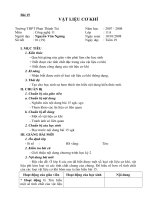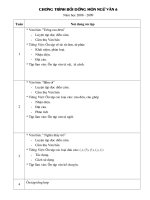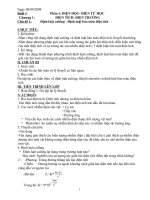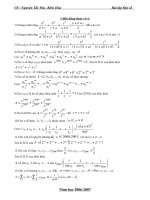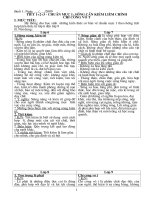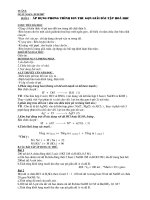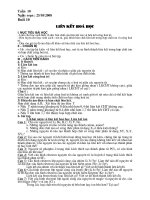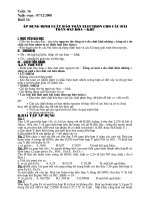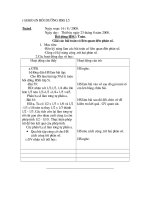Giao an boi duong TA 8
Bạn đang xem bản rút gọn của tài liệu. Xem và tải ngay bản đầy đủ của tài liệu tại đây (88.21 KB, 11 trang )
<span class='text_page_counter'>(1)</span><div class='page_container' data-page=1>
<b>Period 1-2-3: The tenses.</b>
<b>A: Aim:</b>
- Help ss review all the tenses that they have learned. And ask they to do
some exercises.
<b>B: Ojectives: </b>
- By the end of the lesson they will be able to do all exercises.
<b>C: Material: </b>
- extra board.
D: Proceduces:
<b>activities</b> <b>Work</b>
<b>arrangement</b>
<b>*Chatting:</b>
a/ How many tenses have you learned?
b/ What are they?
c/ Ask them to give some examples.
<b>I/ Tenses:</b>
- Elicit from the ss
<i><b>1/ The present simple tense:</b></i>
a/ Use: express a truth, a habit, a rule
b/ Form: + S – verb( s,es).
- S – don’t/ doesn’t – verb.
? Do / Does – S – verb.?
c/ Adverbs of time:
- always, usually, often...
- everyday, in the morning,
- after school
<i><b>2/ The present progressive tense:</b></i>
a/ Use: express an action which is happening now.
b/ Form: + S – am/ is/ are – verb-ing
- S – am/ is/ are – not – verb-ing
? Am/ Is/ Are – S – verb-ing.?
c/ Adverbs of time: now, at the moment, at present.
<i><b>3/ Near futue:</b></i>
a/ Use : express a plan, an object.
b/ Form: + S – am/ is/ are – going to – verb
- S – am/ is/ are – not – going to – V
? Am/ Is/ Are – S – going to – verb?
c/ Adverbs of time: tomorrow, next year/ week/ Sunday…
<i><b>4/ The future simple tense: </b></i>
a/ Use:express an action which will happen in the future.
b/ Form: + S – will – verb
- S – will not ( won’t) – verb
? Will – S – verb?
c/ Adverbs of time: tomorrow, next month,.
<i><b>5/ The past simple tense: </b></i>
a/ Use: express an action which happened and finished in the
past.
b/ Form: + S – verb-ed
- S – didn’t – verb
? Did – S – verb?
c/ Adverbs of time: yesterday, last night/ Sunday...
<b> II/ Practice:</b>
<i><b>1/ Exercise1: Put the correct verbs in the sentences.</b></i>
a/ The children often ( go ) to school by bike.
b/ What you (do ) now? I ( play) soccer.
<b>Whole - class</b>
<b>T - whole class</b>
<b>Individual </b>
a/ go
</div>
<span class='text_page_counter'>(2)</span><div class='page_container' data-page=2>
c/ They ( not do ) their homework last night.
d/ you ( visit) Lan tomorrow?
e/ Mr Minh ( not take) a bus to work everyday.
f/ Listen! The boys ( sing).
h/ What your plan ( be) in this summer?
We ( spent) our vacation in NhaTrang.
<i><b>2/ Noughts and crosses: Make sentences with these words:</b></i>
Last week Usually Tomorrow
At the moment Next year Now
On Sunday <sub>Everymorning</sub> <sub>Yesterday</sub>
<i><b>3/ Change these sentenses into negative and alterative</b></i>
<i><b>sentenses:</b></i>
a/ Mr Minh is Planting the trees in the garden.
b/ The children often go to school by bikes.
c/ I will phone you tonight.
d/ We are going to spend our holiday in Nha Trang.
e/ Last Sunday my mother went to the hospital with Mrs
Huong.
f/ Nhung like going fishing very much.
<b>III/ Homework:</b>
- Review all tenses which have learnt
- Do exercise again
- Make two sentense in each tense.
am playing
c/ didn't do
d/ Will you visit
e/ doesn't take
f/ are singing
h/ Is your plan
are going to spend
<b>Team work</b>
<b>Pair work</b>
<b>Period 4-5-6: structures.</b>
<b>A: Aim:</b>
- Help ss review all the structures that they have learned. And ask they to do
some exercises.
<b>B: Ojectives: </b>
- By the end of the lesson they will be able to do all exercises.
<b>C: Material: </b>
- extra board.
D: Proceduces:
<b>activities</b> <b>Work</b>
<b>arrangement</b>
<b>* Pelmanism:</b>
- Ask them to make snetenses with the reflexive pronouns
I she we It He
myself herself ourseves itself himself
<b>I/ Structures: </b>
<b>1/ Enough:</b>
- Ask them to give the use and the form of “enough”
+ Form:
- S – be – adj – enough – ( for sbd) – to-V
- S – V – enough – noun – to-V.
<b>2/ be going to:</b>
- Ask them to give the use and the form of “ be going to”
+ Use: express a plan, a prediction in the future
+ Form: S – be going to – V
<b>3/ Modal verb:</b>
<b>Team work</b>
</div>
<span class='text_page_counter'>(3)</span><div class='page_container' data-page=3>
- Ask them to list the modal verbs that they have learnt
Ought to can
- Ask them togive the form of modal verbs
=> S – modal verb – V
Ex: You should eat more fruit and vegetables.
<b>4/ Reflexive pronouns:</b>
- Ask them to list the reflexive pronouns.
- Ask them to give the examples.
<b>II/ Practice: </b>
<b>1/ Exercise 1: ( Lucky number)</b>
Combine the following sentenses using the structures with
“enough”.
1/ The weather is warmer today. You can go out.
2/ Is she intelligent? Will she be able to find it out?
3/ They were very quick. They could catch the thief.
4/ The shoes are small. I can’t wear them.
5/ He is strong. He can carry that suitcase.
<b>2/ Exercise 2: </b>
Choose the best answer to complete these sentenses.
1/Mai recieved a letter ... her sister yesterday.
A: to B: for C: of D: from.
2/ What ... she look like? She is beautifull.
A: is, B: does C: will D: did
3/ My brother is old enough ... a car.
A: to drive B: driving C: drives D: drive
4/ Who ... you this coat? My mother did.
A: did buy B: bought C: buys D: does buy
5/ What is your friend like? He is ...
A: strong B: tall C: fat D: sociable
<b>3/ Exercise 3: Read the story about Charles Dickens and</b>
answer the questions:
Charles Dickens was born in Portsmouth in 1812. His family
then lived in London. His father was a clerk in an office. There
were eight children in the family, so life was hard. Charles
went to school and his teacher thought he was very clever.
When he was only eleven, he had to leave school and went to
work on a factory. He worked ten hours a day and earned six
shillings a week. Every night, after work, he walked four miles
back to his room. Charles hated it and never forgot the
experiences. He used it in many novels, especially " David
Copperfield and Oliver Twist"
<i><b>Questions</b></i>
a/ Where did his family live?
b/ How many people were there in his family?
c/ When did he leave school?
d/ How much did he earn a week?
e/ What did he use in his many novels? Why?
<b>Team work</b>
<b>Individual </b>
<b>Team work</b>
<b>Individual </b>
1/ D
2/ B
3/ A
4/ B
5/ D
<b>Pair work</b>
=> in London
=> ten people
=> he was eleven
=> 6 shillings
=> his room
<b>Mod</b>
<b>al </b>
<b>verb</b>
</div>
<span class='text_page_counter'>(4)</span><div class='page_container' data-page=4>
<b>III/ Homework:</b>
- Review the structures.
- Do the exercises again.
<b>Period 7- 8-9: reported speech</b>
<b>A: Aim:</b>
- Help ss review changing the reported speeches that they have learned. And
ask they to do some exercises.
<b>B: Ojectives: </b>
- By the end of the lesson they will be able to do all exercises.
<b>C: Material: </b>
- extra board.
D: Proceduces:
<b>activities</b> <b>Work</b>
<b>arrangement</b>
<b>* Pelmanism:</b>
- Ask them to find the adjectives and their advers.
soft bad good easy hard
softly badly well easily hard
<b>1/ Tenses:</b>
a/ The past simple tense:
- Ask them to give the use and the form of the past simple
tense.
- Ask them to give some irregular verbs.
Run rode
b/ The present simple tense:
- Ask them to give the use and form of the present simple
tense.
- Ask them to give some examples that express future action.
Ex: My father visits my grandmother on this weekend.
<b>2/ Reported speeches:</b>
- Ask them to give the form of changing an imperative sentense
and an advice into the reported speeches.
+ S - ask/ tell - sbd - to - verb
+ S - say - (that) - sbd - should - verb.
- Ask them to give examples.
<b>3/ Asking for favor and offering assistance:</b>
- Ask them to give the expression that asks for favor and offers
assistance. Ask them to give example.
<b>II/ Practice: </b>
<b>1/ Exercise 1: Put the correct verbs in these sentenses:</b>
a/ My sister loves ( cook) but she doesn't like (wash) the
dishes.
b/ the concert ( begin) at 7.30 tonight.
c/ Are we able ( join) the Y&Y Green group?
d/ Nam ( not want) ( go) to the Water park because he ( visit) it
yesterday.
<b>Team work</b>
<b>T - whole class</b>
<b>Team work</b>
<b>T- whole class</b>
<b>Individual </b>
-> cooking, washing
-> begins
-> to join
-> doesn't want to go,
visited
-> did you enjoy
watching
</div>
<span class='text_page_counter'>(5)</span><div class='page_container' data-page=5>
e/ You ( enjoy) ( watch ) the movie on Tv last night?
<b>2/ Exercise2: Change these sentenses into the reported</b>
<b>speeches.</b>
a/ "Please show me your homework?" The teacher said.
b/ "You should keep your room tidy" My mother told me.
c/ "Can you buy me some stamps?" Tom said to me.
d/ "Don't read the answer keys before you finish the task" The
teacher told us.
e/ " Could you open the window for me ?" My brother said.
f/ " Can you held me with using computer?" Nam asked his
mother.
g/ " Don't talk in class." The teacher told the students.
h/ " You should do your homework before going to the class."
My mother said to me.
i/ " Could you take me across the road?" the old woman said to
the boy.
j/ " Lan shouldn't stay up late." Mrs Hoa said to Lan's mother.
<b>3/ Exercise 3: Choose the best answer to complete the</b>
<b>sentenses.</b>
a/ My aunt speak English very ....
A: good B: well C: goodly D: best.
b/ We have math on Tuesday, Thursday, and Friday. It means
we have math ... a week.
A: once B: twice C: three times D: four times
c/ Lan promises to ... Her best in learning English.
A: try B: make C: work D: learn.
d/ The manager asked me .... for him outside his office.
A: wait B: waiting C: to wait D: waited.
e/ Learner do not only learn the meaning ... the spelling and
pronunciation of new words.
A: too B: as well as C: also D: but also.
<b> III/ Homework</b>
- Review all structures.
- Do the exercises again.
<b>Pair work</b>
<b>Individual </b>
a/ B
b/ C
c/ A
d/ C
e/ D
<b>Period 10-11-12: exercises</b>
<b>A: Aim:</b>
- Help ss some ways to do some exercises.
<b>B: Ojectives: </b>
- By the end of the lesson they will be able to do all exercises.
<b>C: Material: </b>
- extra board.
D: Proceduces:
<b>activities</b> <b>Work</b>
<b>arrangement</b>
<b>* Game: "Who rings the bell":</b>
<b> - Choose the best answer to compete these sentenses: </b>
1/ My sister speaks English very …
A: fluent B: fluently C: fluence D: fluentlly
2/ She isn't only beautifull …. intelligent.
A: too B: as well as C: also D: but also
3/ + …………..?
- Yes, what can I do for you?
A: Can you help me B: Let me help you C: May I help you
D: I need a favor
<b>Team work</b>
1/ B
</div>
<span class='text_page_counter'>(6)</span><div class='page_container' data-page=6>
4/ You should learn all new words …... heart.
A: on B: to C: by D: in
5/ Lan promised to try her……….. in learning English.
A: better B: good C: well D: best
<b>I/ Exercise1: Put the correct verbs in these sentenses</b>
1/ My sister loves ( cook), but she ( not like) washing the
dishes.
2/ you ( enjoy) ( watch) the movie on TV last night.
3/ After ( do) her homework, Lan usually ( listen) to the plays
on the radio.
4/ My father used to ( smoke) when he ( be) young.
5/ Hoa doesn't want ( go) to the Water park because she ( visit)
it yesterday.
<b>II/ Exercise2: Read the passage and answer the questions </b>
<b>below.</b>
<b>My last weekend.</b>
On Saturday morning I got up late. I ate breakfast and read a
magazine. In the afternoon I saw a good movie at the Plaza.
That evening I went to a party. On Sunday morning I went to
the club. There I met some friends and we had a good time
together. We swam in the pool and played volleyball. After
lunch I took a nap and went to the church. I come home for
dinnrer around six o'clock and watch television for a while.
Later I had a talk with my best friend on the phone and at
eleven o'clock I went to bed. That's I spent last weekend.
<b> Questions </b>
1/ What did the boy do after breakfast?
2/ Where did he go that evening?
3/ What did he do on Sunday morning?
4/ What time did he have dinner?
5/ Who did he talk on the phone with?
<i><b>III/ Exercise 3: Change these reported speech into the direct</b></i>
<i><b>speech:</b></i>
1/ My sister asked me not to stay up too late.
2/ He said that I should spend more time in the library.
3/ Her teacher said she should revise the lessons carefully.
4/ Mr Minh asked me to buy him some vegetable.
5/ Lan advised me to go to the dentist's.
6/ My English said we should learn twelve new words by heard
in two days.
7/ My teacher asked us to show her our homework.
8/ The old man begged us to give him some money.
<b>Exercise 4: </b>
<b>* Noughts and crosses: Ask them to complete these sentenses</b>
with suitable prepositions.
1 6 5
4 2 7
3 8 9
1/You should learn the irregular verbs (1) heart.
2/ Please wait ( 2) us outside the school gate.
3/ Mrs Hien's daughter should work harder ( 3) her English.
4/ Some learners make a list and put into it the meaning (4)
new words(5) their mother tongue.
<b>Individual </b>
-> cooking, does not
like
-> did you enjoy
watching
-> doing, listens
-> to smoke,was
-> to go, visited
<b>Pair work</b>
-> read magazine
->Went to a party
->Went to his club
->6 o'clock
->His best friend
<b>Individual </b>
</div>
<span class='text_page_counter'>(7)</span><div class='page_container' data-page=7>
5/ Many thanks (6) your letter. I'm very pleased to hear (7)
you.
6/ Please turn ( 8) the lights (9) me. It's getting dark.
<b>IV/Home work:</b>
- Do these exercises again
- Write five reported senteses.
</div>
<span class='text_page_counter'>(8)</span><div class='page_container' data-page=8>
<b>Period 13-14-15: comparison</b>
<b>A: Aim:</b>
- Help ss review the forms of the comparison and do some exercises.
<b>B: Ojectives: </b>
- By the end of the lesson they will be able to do all exercises.
<b>C: Material: </b>
- extra board.
D: Proceduces:
<b>activities</b> <b>Work</b>
<b>arrangement</b>
<b>* Simon says:</b>
T: simon says : Stand up => Ss stand up
Sitdown
Open your book
Close your book
Raise your right hand
Put your hand down
<b>I/ The Present Perfect tense:</b>
<b>1/ The use and the form:</b>
- Ask them to give the use and the form of the Present Perfect
tense:
+ Use: express an action that happened in the past and continue
to the present.
+ Form: (+) S - have/has - Past participle.
(-) S - haven't/ hasn't - Past participle.
(?) Have / Has - S - Past participle?
+ Examples:
a/ I have learnt English for ten years.
b/ The children have n't done their homework yet.
<b>2/ Practice: Put the correct verbs in these sentenses:</b>
a/ How long you ( know) mrs Chi?
I ( know) her for five years.
b/ your dog ever (bite) anyone?
Yes, he (bike) a policeman last week.
c/ We ( not see) her since we ( be) on holiday in Ha Long Bay.
d/ Phuong ( not finish) her homework yet.
e/ Mr Minh ( teach) in this school for 22 years.
f/ you ever (be) to Hue?
g/ We ( learn) English for 5 years.
h/ The students in my school ( not go) camping since 2001.
<b>II/ Comparison:</b>
<b>1/ Equal comparison:</b>
- Ask them to give the form of the equal comparison:
+ Form:
- S - Verb - as (so) - adj/ adv - as - noun.
<b>2/ Comparative: </b>
* Ask them to give the form of the comparative:
+ Form:
- S - verb - short adj/adv + er - than - noun .
- S - verb - more - long adj/ adv - than - noun.
<b>3/ Superative:</b>
* Ask them to give the form of the superative:
+ form:
- S - verb - the - short adj/adv -est.
<b>Whole class</b>
<b>T- whole class</b>
<b>Pair work</b>
- have you known
Have known
- Has … biten?
Has biten
</div>
<span class='text_page_counter'>(9)</span><div class='page_container' data-page=9>
- S - verb - the most - long adj/ adv.
<b>4/ Practice: Rewrite these sentenses.</b>
a/ Your bag is more expensive than mine.
=> ( as - as)
b/ His pen is red. My pen is red, too
=> ( like)
c/ Huong's house is the biggest in this street.
=> ( No house in this street ...)
d/ That ruler is longer than this one.
=> ( short)
e/ My hair is not as long as your.
=> ( longer)
f/ No one in my class is more intelligent than Minh.
=> (most)
g/ Now there are more tall building in the street than ten years
ago.
=> ( less)
<b>* Noughts and crosses:</b>
- Ask them to make sentenses with these words.
different same as- as
more most the
so- as smaller cheapest
<b>III/ Homework</b>
- Comparison.
- Do again these exercises.
<b>Individual </b>
<b>Pair compare</b>
<b>Team work</b>
<b>Period 16-17-18: passive voice</b>
<b>A: Aim:</b>
- Help ss review the forms of the passive voice in some tenses and do some
exercises.
<b>B: Ojectives: </b>
- By the end of the lesson they will be able to do all exercises.
<b>C: Material: </b>
- extra board.
D: Proceduces:
<b>activities</b> <b>Work</b>
<b>arrangement</b>
<b>* Brainstorming:</b>
- Ask them to give all the irregular verbs in the past participle
that they have learned.
Run taken taught
<b>I/ The passive voice:</b>
<i><b>1/ The present simple tense.</b></i>
Active: S - verb ( s,es) - object
<b>Team work</b>
<b>T- whole class</b>
<b>Irregular </b>
</div>
<span class='text_page_counter'>(10)</span><div class='page_container' data-page=10>
Passive: S - am/is/are - PII - (by …)
Eg: Miss Oanh teaches us => We are taught by Miss Oanh.
<i><b>2/ The present progressive tense.</b></i>
Active: S - am/is/are - V-ing - O
Passive: S - am/is/are - being - PII - (by…)
Eg: They are planting trees. => The trees are being planted.
<i><b>3/ The past simple tense.</b></i>
Active: S - V-ed - O
Passive: S - was/were - PII - (by…)
Eg: I finished the work last night. => The work was finished
last night.
<i><b>4/ The future simple tense.</b></i>
Active: S - will - verb - O
Passive: S - will be - PII - (by…)
Eg: My mother will phone you tomorrow. => You will be
phoned tomorrow by my mother.
<i><b>5/ Near future:</b></i>
Active: S - am/is/are going to - verb - O
Passive: S - am/is/are going to be - PII - (by…)
Eg: The ss in my school are going to learn France next week.
=> France is going to be learned in my school.
<i><b>6/ The present perfect tense.</b></i>
Active: S - has/ have - PII - O
Passive: S - has/ have - been - PII - (by…)
Eg: Miss Hoa has taught us for three years.
=> We have been taught by Miss Hoa for three years.
<b>II/ Practice:</b>
<i><b>1/Exercise1: Change these active sentenses into passive ones.</b></i>
a) People don't use this road very often.
b) We will grow a lot of trees in the park.
c) They are painting the living-room light blue.
d) People have developed many defferent paper products.
e) He asked us many difficult questions.
f) They must widen the road soon.
g) She advised me to reuse the milk bottles
h) My siter cleans these rooms eveyday.
i) Waste from chemical factories have caused lots of pollution
j) When does he usually do his homework.
<i><b>2/Exercise2: Change these passive sentenses into active ones.</b></i>
a) This tree was planted by my grandfather.
b) The rubbish hasn't been collected.
c) Is recycled paper being used?
d) Will a new school be built very soon?
e) A lot of work is done everyday.
f) Many trees are cut down to make paper.
g) English is considered the most international language.
h) These doors should be shut before 5 pm.
i) Many lakes and rivers have been destroyed by pollution
from factories.
j) I was given a beautiful glass on my birthday by Hung.
3/ Exercise3: Matching.
1. reuse
2. compost
3. dung
- waste from animals
- a wonderful natural fertilizer
- use things again and again.
<b>T- whole class</b>
<b>Individual </b>
<b>Pair compare</b>
<b>Team work</b>
<b>( Lucky number)</b>
</div>
<span class='text_page_counter'>(11)</span><div class='page_container' data-page=11>
4. plants
5. animals -- Things like cows, pigs, buffaloes…Things like vegetables, grass, rice…
<b>III/ Home work.</b>
</div>
<!--links-->
